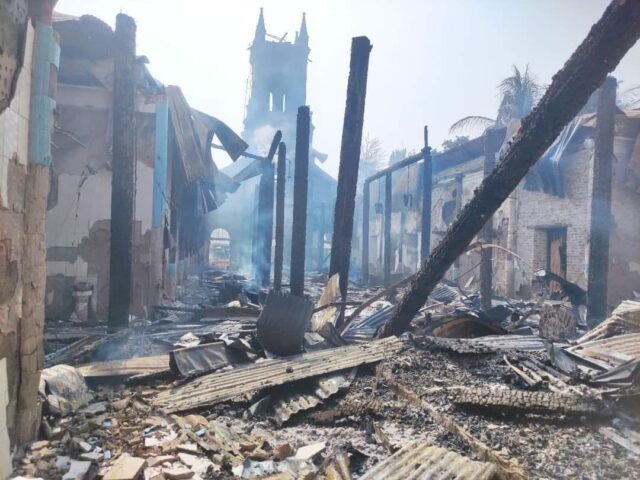ROME — The Burmese army torched a historic Catholic church in the Archdiocese of Mandalay this week and also set fire to a convent of religious sisters.
Soldiers burned to the ground the ancient Church of the Assumption, in Chan Thar, a village inhabited by Catholics in the Sagaing region, as well as the nearby convent of the Franciscan Missionary Sisters of Mary, Vatican News reported.
The nuns fled from their demolished convent along with some 3,000 villagers, who also lost their homes to fires started by the military.
On Sunday, Pope Francis expressed his grief over the attack, noting that the Church of Our Lady of the Assumption was “one of the oldest and most important places of worship in the country,” having been built in 1894.
“I am close to the defenseless civilian population, which is sorely tried in many cities,” the pontiff said following his weekly Angelus address. “May God grant that this conflict may soon end and a new time of forgiveness, love and peace may follow.”

File/A protester holds a sign demanding H&M withdraws from Myanmar, outside H&M in Oxford Street on June 11, 2022 in London, England. Protesters joined trade unions in Myanmar in calling for international brands like H&M, Zara and Primark to stop sourcing their products from Myanmar, due to the brutality and repression under its military junta. (Martin Pope/Getty Images)
The pope concluded by leading the 15,000 gathered in Saint Peter’s Square in the Hail Mary prayer for the intentions of Myanmar.
The ferocity of the attack reflects not only animosity toward the minority Catholic population but also the fact that the area is considered a stronghold of the People’s Defense Forces rebels, who oppose the Burmese military junta currently in power.
According to Sister Rita, one of the religious sisters forced to flee from her torched convent, she and the other sisters urged local inhabitants to leave their homes, and “not to oppose the soldiers and not to resist, to avoid massacres and brutality.”
“The soldiers want to crush any resistance from the civilians,” she said. “They enter the villages, occupy buildings like schools and churches and camp there. From there, they carry out raids from house to house to flush out the rebels.”
“They stayed in our church for three days and when they left they set fire to the church and our convent,” she added.

COMMENTS
Please let us know if you're having issues with commenting.